- AI in the Automobile Market Forecast
- Impact of AI on the Automotive Industry
- Benefits of AI in the Automotive Industry
- Fleet-Based Benefits
- Driver-Based Benefits
- Manufacturing-Based Benefits
- Use Cases of AI in Automotive Industry
- Driver Assistance
- Autonomous Vehicles
- Driver Monitoring
- Artificial Intelligence in Car Manufacturing
- Personal Assistant
- Passenger Experience
- Supply Chain Management
- Automotive Insurance
- Quality Control
- Connected Cars
- AI in Designing
- AI Integration in the Automotive Industry: 4 Leading Car Companies Driving Innovation
- Tesla
- BMW
- Wamyo
- Nvidia
- Future of AI in Automotive Industry
- Challenges of Implementing AI in Automotive Industry and Solutions to Overcome Them
- Data Privacy and Security
- Shortage of Skilled AI Talent
- Building User Trust
- Integration with Legacy Systems
- Embrace the Power of AI in your Automotive Business with Appinventiv
- FAQs
Not long ago, the idea of cars driving themselves or mechanics being alerted before a part breaks felt like pure science fiction. Today, thanks to Artificial Intelligence, it’s fast becoming the norm. The automotive industry is undergoing a massive transformation, and AI is at the wheel.
From autonomous driving and smart manufacturing to predictive maintenance and personalized in-car experiences, AI is reshaping how vehicles are built, sold, and even experienced. And the impact isn’t just technical—it’s financial.
CDK surveyed nearly 250 North American executives and heads of automotive dealerships to understand how AI is perceived in the auto retail industry. AI-enabled dealerships achieve:
- 27% higher showroom appointment set rates
- 26% lead-to-sale conversion rate
- 24% increase in repurchase rates
Meanwhile, a 2019 study by the Capgemini Research Institute found that delivering AI at scale could increase automotive companies’ operating profit by 5% to 16%.
AI in the Automobile Market Forecast
According to McKinsey, autonomous driving could generate $300 billion to $400 billion in revenue by 2035. New research reveals what’s needed to win in the fast-changing passenger car market.
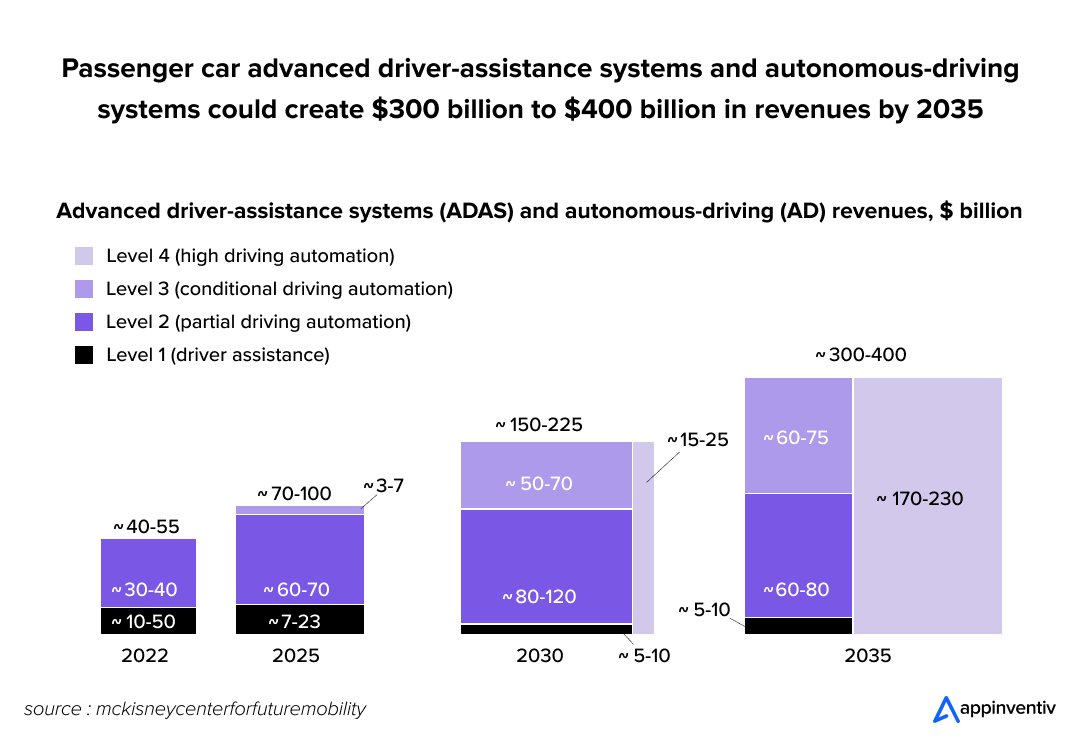
This is more than just technological evolution; it’s a business revolution. Automakers, suppliers, and tech companies are rapidly embracing AI not just to stay relevant, but to lead the future of mobility. As cars get smarter, the businesses behind them are becoming more agile, data-driven, and customer-focused by utilizing AI in the automotive industry.
Let’s discuss some significant benefits and use cases of artificial intelligence in the automotive industry.
Ready to take the next step?
Impact of AI on the Automotive Industry
AI automotive is revolutionizing the industry by boosting safety, efficiency, and innovation. Autonomous vehicles driven by AI transform the transportation industry, decreasing accidents and alleviating traffic congestion. AI-powered predictive maintenance extends vehicle lifespan by identifying issues early. In manufacturing, AI streamlines production, cutting costs and enhancing quality.
Additionally, AI elevates the in-car experience with advanced driver-assistance systems (ADAS), voice recognition, and tailored infotainment. It also provides data-driven insights that improve decision-making in vehicle design and development. AI automotive is propelling the industry towards a smarter, safer, and more sustainable future.
Government support and favorable policies are also pivotal in boosting AI integration across the sector. Additionally, growing investments in AI R&D and strategic partnerships between automakers and tech companies are accelerating innovation, leading to the rapid development of intelligent, AI-powered automotive solutions.
“The value of the company is primarily on the basis of autonomy. That’s really, I think, the main driver of our value.”
Elon Musk – CEO of Tesla
Benefits of AI in the Automotive Industry
The automotive industry increasingly adopts AI technology to streamline operations and improve overall vehicle performance. Artificial intelligence has completely transformed how vehicles are designed, manufactured, and driven by tapping into the potential of big data, IoT, AI, and ML. From autonomous vehicles to advanced safety systems, the advantages of AI in automotive industry are enormous.
Let’s take a closer look at some of AI’s key benefits in the automobile industry, which are categorized into fleet-based, driver-focused, and manufacturer-specific advantages.
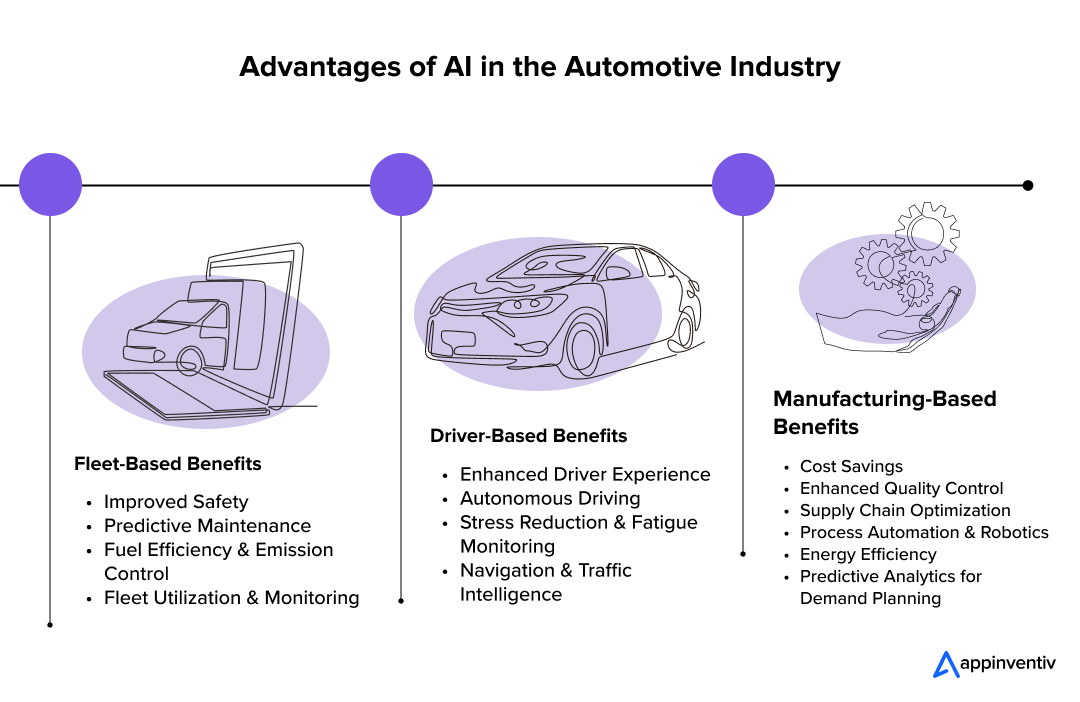
Fleet-Based Benefits
Improved Safety
One of AI’s significant advantages in the automotive industry is improved road safety. AI has enabled highly efficient security systems like lane departure warning (LDW), autonomous emergency braking (AEB), and adaptive cruise control (ACC) to alert drivers to potential hazards, take preventive steps, and prevent fatal accidents.
Predictive Maintenance
Since AI uses the power of IoT in automobiles, it also helps the industry with predictive maintenance. IoT systems assist in tracking vehicles’ real-time conditions by analyzing the vast trove of vehicle data, enabling managers to determine when maintenance is required.
When the IoT sensor suspects a potential issue, it alerts automobile managers to take preventive measures before it becomes a major concern. Moreover, AI also helps reduce emissions, optimize fuel efficiency, and improve the vehicle’s overall performance.
Fuel Efficiency & Emission Control
AI systems analyze driving patterns, traffic conditions, and engine performance in real time to enhance fuel efficiency and minimize emissions. By optimizing acceleration, braking, and route selection, AI contributes to significant fuel savings and supports sustainability goals.
AI intelligently manages power distribution in electric and hybrid vehicles to extend battery life and reduce energy waste. These improvements lower operational costs while aligning fleets with increasingly stringent environmental regulations.
Fleet Utilization & Monitoring
AI enables advanced tracking of vehicle activity, including idle durations, route efficiency, and driver behavior. This data helps fleet managers pinpoint inefficiencies, redistribute workloads, and make informed decisions on vehicle deployment.
AI-driven insights also support predictive maintenance and dynamic scheduling, minimizing downtime and maximizing asset productivity. The result is a more agile, data-informed fleet operation with improved cost control and performance.
Driver-Based Benefits
Enhanced Driver Experience
AI-powered infotainment in smart vehicles provides personalized experiences to passengers and drivers, making their journey safer, smarter, and more enjoyable. For instance, smart voice assistants in cars understand the regional language of the users and perform tasks such as playing music, guiding routes, adjusting the temperature, etc.
Autonomous Driving
Self-driving cars zooming around the roads used to seem like sci-fi a few years back, but now we live in a world where automated vehicles are ruling the market. This autonomous driving technology has delivered a new edge for the industry and a whole new experience for drivers. It has the potential to reduce accidents, increase mobility, and improve traffic flow for physically challenged people who cannot drive.
Stress Reduction & Fatigue Monitoring
Modern AI systems can detect driver fatigue or distraction using in-cabin sensors and facial recognition. Once identified, alerts or automated interventions are triggered, helping prevent accidents. By monitoring driver wellness, AI contributes to safer and more responsible driving behavior. Additionally, these systems can provide rest recommendations, ensuring drivers are always alert and in optimal condition for safe driving.
Navigation & Traffic Intelligence
AI-based navigation apps go beyond simple GPS routing by factoring in real-time traffic patterns, weather conditions, and road hazards. This ensures optimal route planning, reduced travel time, and less time spent in congestion, allowing drivers to focus more on the road and less on logistics. Moreover, AI continuously updates the route based on live data, providing dynamic re-routing suggestions that avoid delays and enhance driving efficiency.
Also Read: A Comprehensive Guide on Building Waze Navigation App
Manufacturing-Based Benefits
Cost Savings
AI adoption in automotive industry significantly helps reduce costs in all aspects of operations, from designing to manufacturing. By optimizing manufacturing processes, improving automotive supply chains, and identifying potential issues in vehicles, AI can help reduce costs in various ways.
Overall, the advancements of AI have made a massive contribution to the growth of the automotive industry, transforming how we interact and drive our vehicles.
Also Read: How to adopt artificial intelligence in your business? A complete guide
Enhanced Quality Control
Computer vision powered by AI ensures higher-quality products through real-time inspections during manufacturing. These systems can detect even the smallest defects, ensuring every part meets stringent quality standards, reducing recalls and increasing customer satisfaction.
AI also enables continuous learning, allowing quality control systems to improve over time by identifying new patterns of defects. This boosts production efficiency and helps maintain brand reputation through consistent product reliability.
Supply Chain Optimization
AI is crucial in improving logistics and supply chain operations within the automotive industry. Through intelligent demand forecasting, inventory management, and route optimization, companies can reduce delays, avoid overstocking, and respond swiftly to market changes.
It also helps predict potential disruptions, such as raw material shortages or transportation delays, allowing for proactive planning. Additionally, AI-driven analytics can uncover cost-saving opportunities and improve supplier collaboration.
Process Automation & Robotics
AI-powered robotics and automation technologies are revolutionizing manufacturing by optimizing workflows, enhancing production speeds, and ensuring consistent quality while significantly reducing human error.
These advanced systems handle repetitive and labor-intensive tasks, increasing operational efficiency and elevating precision across assembly lines. Moreover, AI empowers manufacturers to rapidly scale production while upholding the highest quality standards, offering a competitive edge in the marketplace.
Energy Efficiency
AI plays a critical role in optimizing energy consumption throughout the manufacturing process. By continuously monitoring energy usage patterns, AI can dynamically adjust operations to reduce energy waste in real time. This helps lower operational costs and advances sustainability goals, as reducing energy consumption directly contributes to a smaller carbon footprint in manufacturing processes.
Predictive Analytics for Demand Planning
Leveraging historical data and analyzing market trends, AI equips manufacturers with the ability to forecast consumer demand accurately. This predictive intelligence enables better control over production volumes and material requirements, minimizing the risk of both underproduction and excess inventory. It ensures that automotive manufacturers can precisely align their output with market demands, optimizing resource allocation and streamlining operations.
Use Cases of AI in Automotive Industry
In the last couple of years, automobile experts have adopted four revolutionary trends – autonomous driving, car connectivity with data sensors, electrification, and shared mobility, better known as ACES. The collective concept of ACES fuels growth within the automotive industry, and AI is the driving force here.
The use of AI in automotive industry is broad and diverse. From design and manufacturing to sales and maintenance, the applications of artificial intelligence can be noticed throughout a vehicle’s life cycle. This is why top-tier automotive brands strive to incorporate AI into their vehicles.

Let’s dive deeper into some of the common AI use cases in the automotive industry:
Driver Assistance
Driver assistance is one of the best uses of AI in the automotive industry. AI-enabled systems use sensors to assist with steering and pedestrian detection, monitor blind spots, and alert the driver accordingly, enabling them to take preventive measures to stay protected against road accidents. This technology is becoming a core feature in AI vehicles, enhancing safety and convenience.
The growing connection between AI and cars is paving the way for smarter, more intuitive driving experiences that adapt to real-time conditions and driver behavior. Advanced AI systems can also learn from drivers’ habits over time, improving assistance accuracy and personalizing support. As these technologies evolve, they support drivers and prepare the groundwork for fully autonomous mobility.
At Appinventiv, our team developed ActiDrive, an intelligent driver-assistance app that enhances road safety through gesture-based controls. Leveraging advanced optical recognition technology, ActiDrive allows drivers to manage the vehicle’s infotainment system without touching the screen, reducing distractions and keeping their focus where it matters most: on the road.
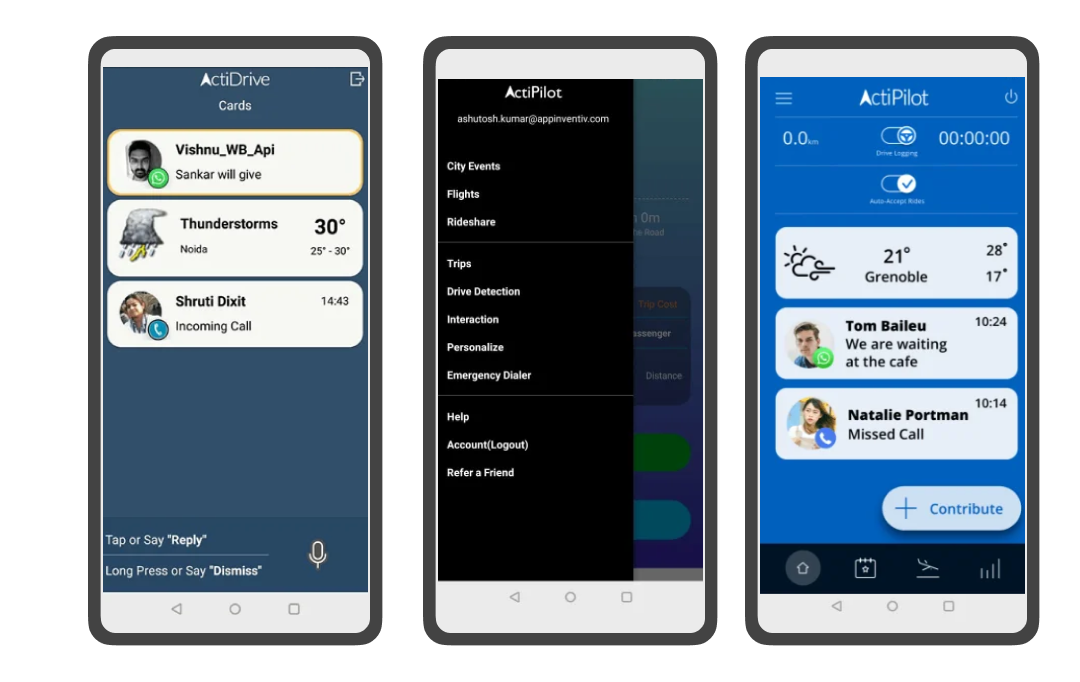
ActiDrive is more than just a control tool; It is a smart co-pilot. It tracks trips, identifies commonly traveled routes, and delivers real-time insights such as journey duration and distance, helping drivers stay informed and in control at all times.
Autonomous Vehicles
Autonomous vehicles—next-generation cars equipped with self-learning and self-driving capabilities are among the most groundbreaking outcomes of artificial intelligence in the automotive space. With advanced technologies like machine learning, deep learning, and big data, these vehicles can navigate roads with minimal human input while following traffic rules and ensuring safety.
AI in car manufacturing is revolutionizing how cars are designed, built, and tested, bringing greater precision, speed, and efficiency to the production line. This broader AI integration in the automotive industry drives innovation at every stage, from predictive maintenance and smart logistics to real-time quality monitoring and supply chain optimization. While regulatory challenges still exist, the dream of fully autonomous, AI-powered mobility is no longer distant.
Driver Monitoring
AI algorithms monitor whether the regular driver is in the car or someone else is driving and automatically adjust the mirrors, seat, and even temperature when the known user is in the driver’s seat. Additionally, AI systems track the driver’s eyes and head position to detect signs of drowsiness and alert the driver accordingly.
As part of the broader innovations in the AI automotive industry, these driver monitoring systems are enhancing safety, comfort, and personalization, making vehicles smarter and more responsive to human behavior.
Artificial Intelligence in Car Manufacturing
The automotive industry heavily relies on manufacturing, where a small error can cause serious problems. But artificial intelligence automotive solutions, like generative AI, can significantly improve car-making, making it more advanced and efficient. For instance, manual labor picks parts from conveyor belts, which is an inefficient and time-consuming way to complete the car-making process.
However, with automotive artificial intelligence, robots can autonomously pick parts, minimize human intervention, and speed up the manufacturing process. Additionally, AI in automotive manufacturing utilizes robots that alert humans in case of any unexpected machine failure, preventing mishaps. These innovations also reflect how artificial intelligence in cars shapes production and the future of driving experiences.
Personal Assistant
While automobile companies often prefer implementing third-party voice assistants like Alexa and Siri, some industry players choose to build their own voice-recognition software. Such AI-enabled personal assistance in cars helps make calls, adjust the temperature, change radio stations, play music, inform about the gas amount in the tank, and do a lot more.
Most importantly, voice recognition tools have high personalization capabilities, meaning they can remember the users’ interests and make adjustments based on their history. These systems are a prime example of artificial intelligence in vehicles, enhancing in-car experiences by making them more intuitive, responsive, and user-centric.
Passenger Experience
Considering passengers’ experience and safety on the road, automotive manufacturers strive to upgrade their vehicles with all possible advanced technologies, such as IoT, image data, NLP, and object identification. In addition, specific commands allow passengers to listen to their favorite music, order food, and engage in other engaging activities while enjoying their journey on the road.
These innovations enhance comfort and reflect the rapid rise of automation in the automotive industry, where AI systems are seamlessly integrated into the driving and passenger experience. From automated entertainment to real-time route optimization and in-cabin monitoring, automation redefines modern mobility. As a result, vehicles are becoming more intelligent, interactive, and capable of delivering a truly personalized travel experience.
Supply Chain Management
AI in the automobile industry is a valuable innovation in efficiently managing its complex supply chain modules. A single vehicle has around 30000 distinct parts arriving from different corners of the world, making it an intimidating task for automotive managers to monitor the transportation journey of the components and track their arrival at the destination points.
The complex nature of importing distinct vehicle parts makes car-making a real struggle. In this scenario, integrating AI and ML in the supply chains can help manufacturers create a fully automated system to manage the supply chain system efficiently, adjusting volumes and routes to the expected demand spikes for parts.
The growing adoption of AI in automotive industry is streamlining these operations by enabling predictive logistics, real-time tracking, and data-driven decision-making—ultimately reducing delays, costs, and inefficiencies across the board.
“Instead of waiting for analysis for weeks, we can do that in minutes and make a decision in the afternoon.”
By Ned Curic (Chief Engineering & Technology Officer, Stellantis)
Automotive Insurance
AI in automotive insurance is highly beneficial for both insurers and drivers alike. AI algorithms help speed up the insurance claim process in case of a mishap or a fatal accident. The AI capabilities, like object detection, image dataset, etc., help the driver collect incident data and fill out claims easily. On the insurer’s side, AI for the automotive industry helps insurance companies process images and analyze vehicle damage efficiently to eliminate discrepancies and process claims faster.
Quality Control
Maintaining the quality of vehicles is the prime concern of an automobile owner to keep a higher customer count. However, inspecting vehicles manually can lead to fewer defect detections, slower issue resolution, and higher turnaround time. On the other hand, AI-based data annotation helps manufacturers detect even the minutest defect in the vehicles at an early stage and alert them to resolve it before it becomes critical. The AI system informs users which parts of the vehicles need to be changed and which parts call for maintenance.
Connected Cars
The rapid growth of IoT use cases in AI systems enables vehicles, smart watches, mobile phones, and infrastructure to connect, making self-driving cars much safer and a pleasing experience.

For instance, connected cars can communicate with each other on the road to maintain a safe distance. Furthermore, connected vehicles help traffic managers get a bigger picture of the road situation and efficiently manage traffic flow.
AI in Designing
Automobile manufacturers have to handle various sorts of tasks, right from chalking out the ideas for a car model to designing it in the same way, which can be very time-consuming. But with AI in the automotive industry, manufacturers and architects can perform real-time tracking, programmable shading, and other chores much faster to execute the car design process.
With faster and better design workflow, AI helps minimize the time spent on design approval and sanction. Also, AI image datasets help manufacturers generate countless designs for better product ideas and workflow for autonomous vehicles.
These are some of the many use cases of AI in the automobile industry, significantly redefining the industry with the potential to transform how vehicles are designed, developed, and driven.
Let our AI developers automate and advance your business with innovation-driven AI systems.
AI Integration in the Automotive Industry: 4 Leading Car Companies Driving Innovation
AI is steadily transforming the automotive landscape, bringing smarter systems and enhanced capabilities to vehicles and operations alike. Several global automotive companies have already begun adopting AI automotive solutions to stay ahead of the curve. Here’s a look at four such industry leaders embracing this shift.

Tesla
Tesla stands at the forefront of automotive artificial intelligence, transforming vehicles’ operations through real-time data processing, neural networks, and smart decision-making capabilities. Its AI-driven systems enable features like self-parking, lane assistance, and auto-pilot, setting a high benchmark for intelligent EVs. Tesla’s continued investment in AI ensures its vehicles evolve with each update, delivering smarter, safer experiences to users worldwide.
Bonus Read: How Much Does It Cost to Build an Advanced Driver Assistance System Like Tesla Autopilot
BMW
BMW is a strong example of how generative AI in automotive is shaping the future of design and development. The company uses AI to create vehicle prototypes and enhance manufacturing efficiency and customer experience. Its integration of AI spans more than 400 applications, including energy management, quality control, and intelligent in-car assistants, demonstrating the brand’s commitment to AI-led innovation.
Wamyo
Waymo is a leading force in AI for autonomous vehicles, pioneering the use of AI in self-driving vehicles, delivery vans, and autonomous trucks. Its AI systems interpret sensor data, traffic patterns, and real-time conditions to navigate safely without human input. Waymo sets the standard for truly driverless mobility solutions with millions of autonomous miles driven.
Nvidia
Nvidia is critical in advancing AI for automotive industry solutions by providing powerful hardware and software platforms that support AI applications in vehicles. Its chipsets and AI models help process massive amounts of sensor data for tasks like real-time object detection, driver monitoring, and navigation. Nvidia’s technology enables automakers to build smarter, safer, and more responsive cars.
Also Read: AI in transportation – 10 benefits and use cases for modern enterprises
Future of AI in Automotive Industry
AI is rapidly becoming the cornerstone of transformation in the automotive industry. It is not an enhancement but a complete rethinking of how vehicles operate, are manufactured, and interact with drivers.
This technological shift extends beyond autonomous driving, deepening into intelligent production systems, predictive analytics, and personalizing in-car experiences. As AI capabilities evolve, the industry will see vehicles that are not only autonomous but also agile, energy-efficient, and deeply integrated into the digital ecosystem.
The utilization of AI in automotive market is experiencing explosive growth. According to a report by McKinsey, nearly 12% of passenger cars will be equipped with Level 3 or higher autonomous technologies, which rely heavily on AI by 2030. This rapid growth signifies a major disruption, as AI fundamentally alters vehicle design, manufacturing processes, and customer interactions. The integration of AI is setting the stage for a new era, where innovation, efficiency, and automation define the future of transportation.
- AI-Enhanced Manufacturing: Utilizing AI-driven automation in production lines to improve precision, efficiency, and cost-effectiveness while streamlining operations.
- Predictive Maintenance: Harnessing AI to predict potential vehicle issues before they arise, minimizing downtime, and enhancing overall vehicle reliability.
- Personalized In-Car Technology: AI customizes in-car systems based on individual driver preferences, covering areas such as navigation, infotainment, and climate control, which is now built into 40% of cars, as per a report by market.us.
- Autonomous Driving Progress: Advancing self-driving technology through machine learning, sensor fusion, and real-time decision-making capabilities.
- Electric and Connected Vehicles: AI optimizes battery management and enables seamless communication between vehicles and smart infrastructure for improved efficiency. In McKinsey’s 2023 Global Automotive Connectivity Executive Survey, 55% of auto executives ranked connected cars as one of the top two trends shaping the future of mobility.
- Advanced Safety Features: AI-powered safety systems improve road safety, such as collision avoidance and emergency braking. For instance, forward collision warning combined with autobrake is associated with a 50% decrease in front-to-rear crashes and a 56% decrease in crashes with injuries. (Source: Wikipedia)
- AI-Driven Supply Chain Optimization: Transforming automotive supply chains with AI analytics, enhancing inventory management, demand forecasting, and resource allocation.
“The future is going to be good for the AIs regardless; it would be nice if it would be good for humans as well.”
By Ilya Sutskever (Co-founder, OpenAI)
Challenges of Implementing AI in Automotive Industry and Solutions to Overcome Them
Implementing AI in the automotive industry holds massive potential, but it has its hurdles. From high development costs to data privacy concerns, companies face several challenges along the way. Let’s look at some of the top challenges and solutions to tackle those.
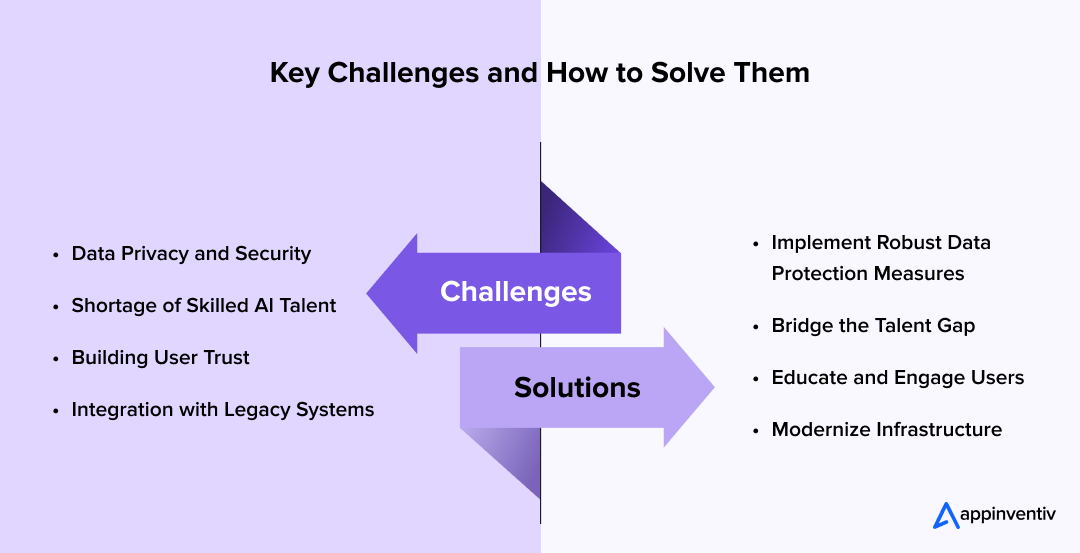
Data Privacy and Security
AI systems process vast amounts of sensitive driver and vehicle data, raising concerns around data breaches, misuse, and regulatory compliance. Any breach in data security could damage brand reputation and lead to hefty fines. User consent and transparency are increasingly under scrutiny.
Solution: Enforce strong data encryption, ensure compliance with data protection laws (e.g., GDPR), conduct regular audits, and adopt cybersecurity best practices to build user trust.
Using decentralized data storage and anonymization techniques helps mitigate risks while maintaining data utility.
Shortage of Skilled AI Talent
There’s a high demand for professionals who understand AI and automotive systems, making it tough to build in-house teams. Hiring delays and steep salary demands slow down project timelines. Talent is often drawn to big tech firms, creating a gap for automakers.
Solution: Upskill existing employees through training programs, collaborate with academic institutions, and outsource specific AI functions to experienced vendors. Encouraging internship pipelines and contributing to open-source AI projects can also attract emerging talent to your organization.
Building User Trust
Drivers may hesitate to adopt AI-powered features like autonomous driving due to safety fears or a lack of understanding. High-profile accidents have intensified public skepticism, and many users are unaware of how AI systems work.
Solution: Focus on user education, demonstrate safety through real-world testing and transparent communication, and introduce AI features gradually to build confidence. Incorporating user feedback into updates and offering clear onboarding experiences can improve trust and adoption.
Integration with Legacy Systems
Many automakers still rely on legacy systems incompatible with modern AI technologies. Integrating AI into outdated infrastructures can lead to inefficiencies, delays, and added complexity during deployment.
Solution: Gradually modernize legacy systems by adopting modular, API-first architectures that allow AI components to plug in seamlessly. Use middleware solutions to bridge the gap during transition, and prioritize scalable platforms that can evolve with your AI strategy.
Embrace the Power of AI in your Automotive Business with Appinventiv
The inclusion of AI in the automobile industry has been a game-changer. It helps automobile companies design and build new prototypes, increase supply chain efficiency, reinforce drivers’ safety on the road, improve passenger experience, assist in driving more efficiently, and enable predictive maintenance of factory equipment and vehicles on the road.
It is high time for the automotive industry to give AI a front seat in business and leverage this technology to augment possibilities and reach its ultimate business goals.
As a trusted AI development services provider, Appinventiv is dedicated to building innovation-driven solutions that make your automobile business smart and efficient. From intelligent driver assistance systems to predictive maintenance and connected vehicle platforms, we harness AI’s full potential to future-proof your automotive offerings.
We are a leading automotive software development company, providing state-of-the-art generative AI development services worldwide. No matter what your plan or project requirements are, our top-notch custom AI solutions will perfectly integrate with your business goals.
Get in touch with us now to discover how we can help you integrate AI in the automotive industry.
FAQs
Q. What is AI in the automotive industry?
A. AI refers to a machine’s ability to perform tasks that typically require human intelligence, such as learning, reasoning, decision-making, and problem-solving. In the automotive sector, AI transforms how vehicles are built, driven, and experienced. A common question today is “how is AI used in cars?” The answer lies in its wide range of applications—from improving vehicle performance and driver safety to enhancing the passenger experience through real-time data analysis and intelligent decision-making.
AI in the automotive industry encompasses a wide range of technologies, such as computer vision, machine learning, NLP, speech analytics, and robotics. These technologies help develop self-driving cars, advanced driver assistance systems, personal assistance, and more. Additionally, AI helps optimize production processes, reduce costs, improve supply chain management, and make the automotive industry more efficient.
Q. How is AI impacting the automotive industry?
A. The impact of AI in the automotive industry can be witnessed in the form of improved vehicle safety, performance, and efficiency. It helps visualize the concept of autonomous driving, electric vehicles, and personalized in-car experiences, among many other applications.
Also, AI in the automobile industry helps optimize manufacturing processes, reduce costs, and improve supply chain management. In simple terms, AI is transforming the automotive industry, making it safer, smarter, more sustainable, and more efficient.
Q. What is the future of AI in vehicles?
A. The future of AI in vehicles is highly influential and can potentially transform the automotive industry. In the future, AI-based solutions will add more value to cars, resulting in further advancements in the development of autonomous driving, maximizing production capacity, accelerating production, and gathering data for improved road safety and passenger experience.
As AI technology continues to evolve, it is set to bring a huge revolution in the entire automotive industry by disrupting traditional ways of transportation and enabling new business models.
Q. What is predictive maintenance in the context of AI automotive?
A. In the automotive industry, predictive maintenance powered by AI uses Machine learning Development services and vehicle sensor data to foresee potential issues before they become critical.
This anticipatory approach ensures maintenance is performed just in time, reducing unplanned downtime, lowering repair expenses, and prolonging vehicle lifespan, thereby improving overall operational efficiency and reliability.
Q. How does AI contribute to cost savings in the automotive industry?
A. AI drives cost savings in the automotive industry by enhancing production efficiency, reducing waste, and improving quality control. Through predictive maintenance, AI prevents unexpected breakdowns, minimizing costly downtime. It also optimizes supply chain management by accurately predicting demand and reducing surplus inventory.
Additionally, AI-driven automation in manufacturing reduces labor costs and accelerates production timelines, further increasing efficiency and boosting profitability across the automotive sector.



10 Use Cases and Benefits of How AI Agents Are Revolutionizing the Retail Industry
Key takeaways: AI agents in the retail industry are revolutionizing businesses by enhancing customer experience and streamlining operations. From personalized recommendations to predictive analytics, AI offers tangible benefits like increased conversions and reduced costs. AI adoption can lead to scalable growth and a competitive edge in the retail industry. Retailers must consider data strategies, talent…
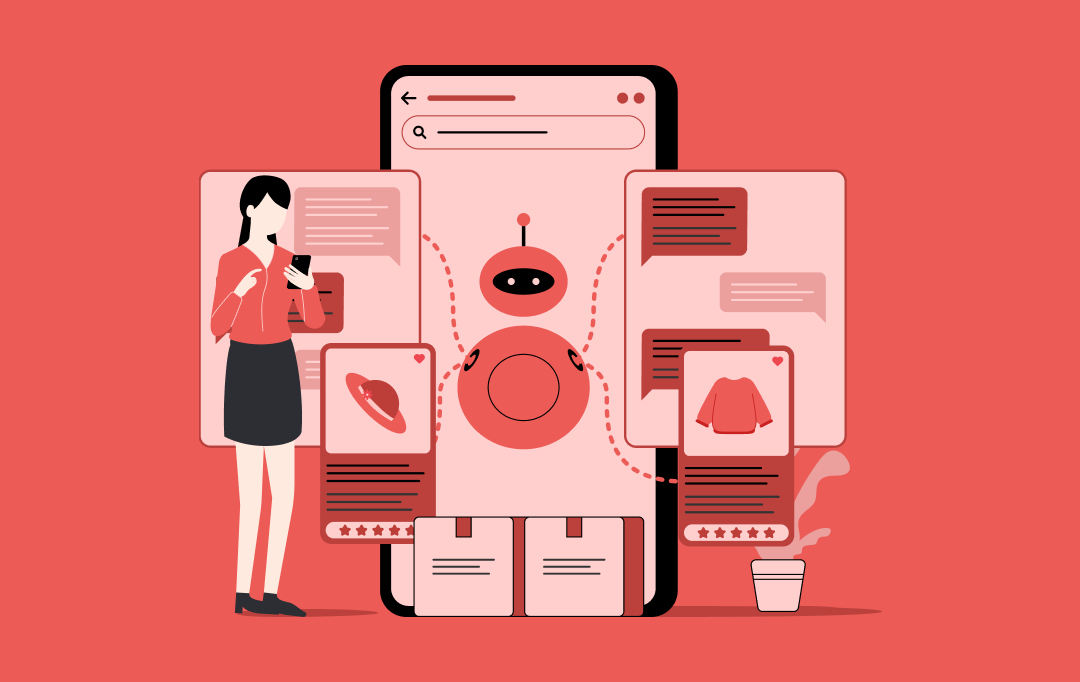
12 Ways AI is Revolutionizing the Fashion Industry
Key takeaways: AI in fashion is booming, with a market value of $28.48 billion by 2032 and a 39.43% CAGR. It's transforming design, trends, shopping, manufacturing, and customer service. Top brands like Zara and H&M report 200% higher conversions, 64% fewer returns, and 25% better retention. Success demands strategy, data infrastructure, and phased AI integration…

How Much Does It Cost to Build an App like Janitor AI?
Key takeaways: Cost Breakdown: The cost of app development varies, with an MVP App costing $40,000 to $90,000, a Mid-Tier App costing $100,000 to $200,000, and an Enterprise Grade App costing $300,000 to $ 500,000 or more, depending on features, complexity, and the expertise of the development team. Key Factors: Platform choice, AI integration, and…

















